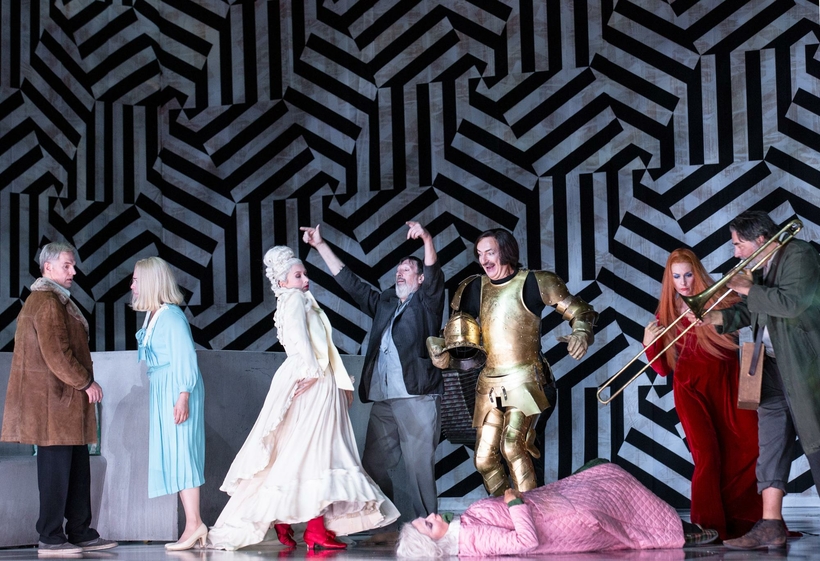Center stage stands an open Steinway. A smoldering caveman in coat and tails sweeps on and takes his place at the keyboard. It’s a half hour before he gets a chance to play.
Pikovaya Dama, or The Queen of Spades, is the rare opera that calls for a piano. Tchaikovsky uses its colors prismatically but very sparingly. Yet in David Marton’s new production at La Monnaie in Brussels, filmed live in September, the invented figure of a “Stage Pianist” gets the diva treatment. In the camera-ready person of Alfredo Abbiati—by day a respected vocal coach—he’s all over the place. At one point, he goes full Alley Oop, doffing concert dress for animal skins and a club. You expect fresh takes on the classics to be off the wall, but not like this.

It’s down in the pit, meanwhile, that real news is being made. Under the French star contralto turned podium sensation Nathalie Stutzman, the orchestra steps up to its rightful role as the opera’s scintillating omniscient narrator. Double basses that thump in your ribcage, the jaunty riff of a toy trumpet, the rococo sparkle of a court masque, the fatal undertow of feverish passion—Tchaikovsky lays on such Hoffmannesque inventions with a lavish hand, and Stutzman sharpens our ear to every one. Yet as attuned as she naturally would be to the singers’ whims, her pace is ever brisk, no wallowing allowed.
Conceived as 18th-century costume drama, Pikovaya Dama unfolds this time in a seedy contemporary Russian apartment block, populated with workaday loafers and hausfraus in their Goodwill best. In hallucinatory episodes, Op Art wave patterns on the floor plus Op Art starbursts on the back wall jazz the eyes, but for the most part, the hermetically isolated, irrelevant locale stimulates a viewer’s imagination not at all. Nonetheless, as Fate tightens the noose, the figures we need to invest in gradually emerge in their true colors.

The pale, sunken-eyed tenor Dmitry Golovnin haunts the stage as Gherman, a shabby officer who lives for the cards he cannot afford to bet on, his soul torn between agonies and raptures. Golovnin’s eloquence across the romantic spectrum takes a while to sneak up on you, but when it does, you’re hooked.
His “angel” is Lisa, trapped in the household of her grandmother, an imperious Countess with a scarlet past. “Who,” Pushkin writes in the original novella, “can tell the torments of a poor little companion attached to an old lady of quality?” To escape, this poor little companion torpedoes her engagement to a dream fiancé, casts her lot with a dodgy stranger, and pays with her life. Cast against type, the foursquare soprano Anna Nechaeva catches fire in the gathering gloom. As the Countess, the veteran mezzo Anne Sofie von Otter shuffles about like a bag lady. Coming back as a ghost, she pours her secret message not into the spooked Gherman’s listening ear but into the receiver of a pay phone. It’s a stroke worthy of Stephen King.
Queen of Spades is available for streaming on OperaVision and on YouTube
Matthew Gurewitsch writes about opera and classical music for AIR MAIL. He lives in Hawaii

